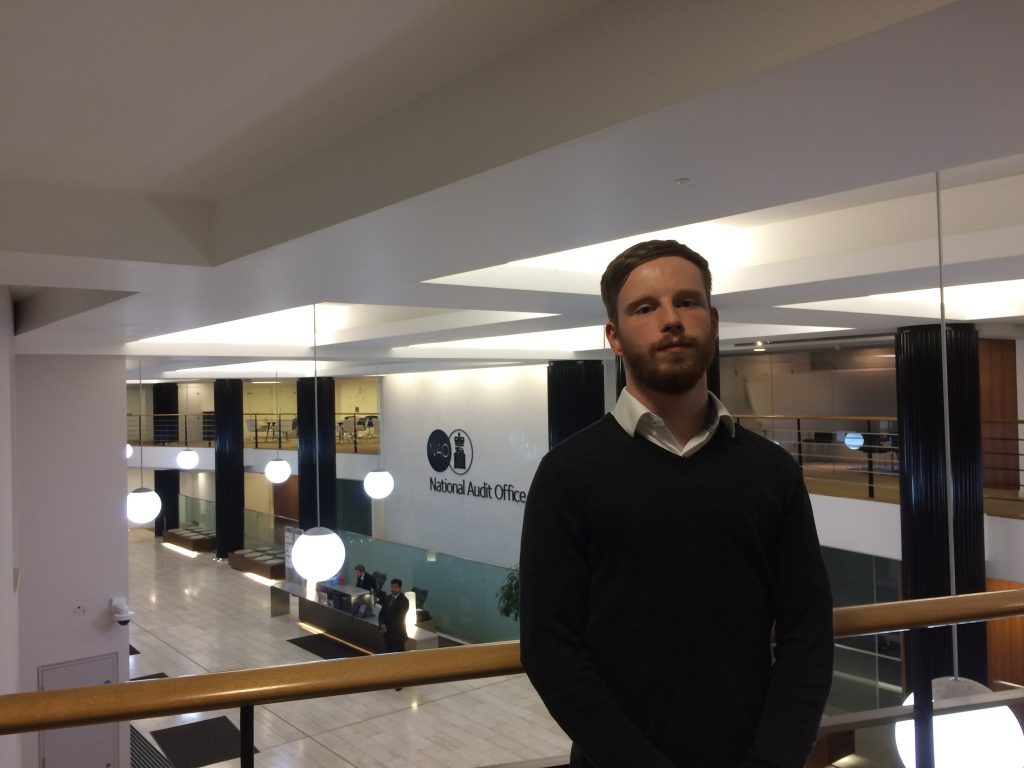
The NAO has recently introduced a Data Science internship, allowing people to participate in a year long scheme working with our Value for Money teams. Successful candidates will spend most of their time applying strong quantitative and qualitative analytical skills, to build and implement analytical tools to support our range of assurance work. Michael Gayler joined us in September as one of three interns, here’s how he’s getting on.
What attracted you to the NAO?
I am doing a Maths degree at University and it allows me to take a year out between my second and third year to gain work experience. I wanted to do this because I went straight from 6th form to university and as well as taking a break from studying, I wanted the opportunity to extend my knowledge of applying Maths in practice.
I applied for several placements and I was particularly attracted to the NAO as it seemed like a unique opportunity to work within an organisation that has a reputation for being at the forefront of innovation in auditing and analysis (along with and sometimes more so than the big four).
Being located in Victoria is a bonus as it allows me to explore central London and is close to the Houses of Parliament.
What was the recruitment process like?
It was a two stage process: submission of a CV and cover letter followed by a one day assessment centre for those who were shortlisted.
In the covering letter, we were asked to provide detailed answers regarding aptitude and competencies that were specifically tailored to working at the NAO. An example of this was having to submit a computerised model of complex analysis that I had used previously and explaining its workings.
The assessment centre included:-
- An overview and introduction to the NAO in the form of a Q&A with some current employees and trainees.
- An observed group exercise.
- An excel competency assessment that tested our ability to model information quickly and efficiently under timed conditions.
- A one-to-one interview which included a discussion and test of our model.
First two months.
In the first two months the three of us who were successful in getting the placement have gone through a lot of training and guidance. We have spent a month learning to program in R using DataCamp, an online training environment, and a syllabus provided by the NAO. This has been very useful to learn as the use of R is becoming more important for the NAO to try and streamline and aid efficiency in financial audit and VFM studies.
I found the R training challenging, but rewarding as I did not have much experience with programing before. DataCamp was (for the large part) a very engaging learning tool, giving us clear instructions to work with and allowing us to actually write real code as opposed to just reading about it.
In the second month we got to put our skills into practice by making an R program and then later an interactive application built using R Shiny. I found this to be an extremely valuable experience because it allowed me to put my learning into practice and see the challenges of using real-world data sets. We also had to present our code and application to the team and had to explain how and why we chose to approach the problem like we did.
Challenges and support.
Having to get up early every day of the week and facing the London commute and then work for 7/7.5 hours a day is a big change from the more relaxed setting of Uni. The first couple of weeks were challenging but you quickly get into a routine. This has been aided by the people I’ve been working with and the office environment and the fact the work is interesting and diverse.
The NAO have been very supportive in this transition with a clear management structure and willingness from everyone to help and explain acronyms.
What next?
The NAO has a clear structure of objective setting that you do with your manager so that they know what you want to achieve and can help you with it as well as ensuring your work is aligned with the requirements of the job and team.
I have been integrated into the new Data Analytics Research Team (DART) and I will be able to work on projects which will have an impact on the entire office. I am looking forward to increasing the effectiveness of my work at the NAO and meeting new people within the organisation. The skills and experience I am gaining will serve me well in the future and certainly in my final year of university and dissertation.
